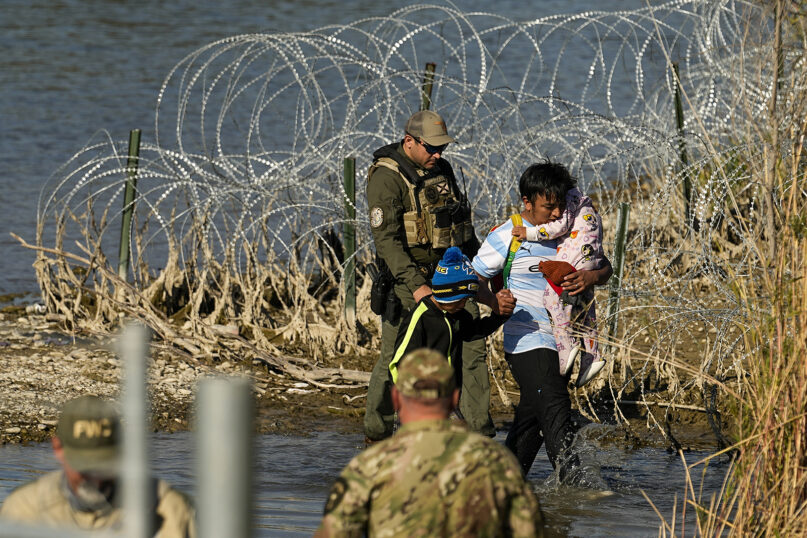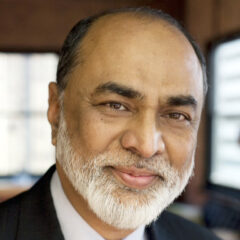(RNS) — U.S. faith communities have long served as the moral compass of the nation in moments of crisis. Religiously affiliated organizations play a critical role in the nation’s social safety net, especially during times of upheaval. From feeding the hungry to sheltering the homeless, religious organizations often fill the gaps left by government inaction.
President-elect Donald Trump’s pledge to use the U.S. military to deport millions within a year marks a disturbing escalation in American immigration policy. If it goes ahead, it will be unprecedented, causing mass upheaval for undocumented immigrants but also a broader attack on families and communities of color. Faith communities will necessarily be part of how we as Americans respond, beginning now.
Deportation doesn’t just remove individuals. It tears at the fabric of American society. For every undocumented person deported, nearly four people — spouses, children and extended family members — are directly impacted. With Latino immigrant households averaging 3.66 members, at least one deportation plan could throw at least 4 million lives into chaos.
Trump’s policy rests on the deepening of racial profiling and systemic biases. Communities of color, particularly Latinos and Black migrants, are in the crosshairs. The profiling won’t stop there: Muslims are all too familiar with the impact of discriminatory practices. Post-9/11, at least 700,000 Muslims were interrogated by the FBI, sparking an era of distrust and fear that persists today. We have seen this playbook before: It begins with fearmongering and ends with the erosion of civil liberties for everyone.
As entire communities will be displaced, leaving families in desperate need of support, faith-based charities, already stretched thin, will face unprecedented demand. Meanwhile, Trump’s broader policies — such as tax cuts for the wealthy and deregulation — threaten to exacerbate poverty and homelessness, further straining these organizations’ ability to serve their communities.
Faith communities must begin now to collaborate across denominations and traditions to build a broad coalition advocating for compassionate policies. This includes fostering partnerships among evangelical Christians, Catholics, Jews, Muslims and other faith groups who share a commitment to human dignity, the sanctity of family and the moral imperative to support the vulnerable.

Migrants are taken into custody by officials at the Texas-Mexico border, Jan. 3, 2024, in Eagle Pass, Texas. (AP Photo/Eric Gay)
Many faith leaders have already spoken about the harm deportations will cause vulnerable communities. Immediately after the election, Omar Angel Perez of Faith in Action called for collective action to create a just, equitable society. Mark Hetfield, president of HIAS, warned that mass deportations would devastate families, communities and the economy. Krish O’Mara Vignarajah, head of Global Refuge, urged the administration to recognize the immense contributions of immigrants and refugees to the nation.
In addition, three U.S. Catholic bishops have reaffirmed solidarity with immigrants, emphasizing their inherent dignity as children of God.
This is not only a political fight. It is a moral obligation deeply rooted in the teachings of all major faith traditions. Whether it is the Christian call to “love thy neighbor as thyself,” the Islamic command to stand for justice as exemplified in the Quran: “O you who believe, be persistently standing firm in justice … ,” the Jewish principle of tikkun olam (repairing the world) or the many other spiritual teachings that emphasize compassion, solidarity and care for the vulnerable, faith leaders have a sacred duty to act.
Faith-based advocacy alone is not enough. Faith leaders must also coordinate resources to provide shelter, food and legal aid to those at risk.
Trump’s reelection presents a defining moment for America. As we face the stark reality of these divisive policies, let us remember that resisting the forces of injustice and standing in solidarity with our neighbors is an expression of our highest values.
Will we come together to defend the values that define this nation — compassion, justice and inclusion? The mass deportation plan is going to be a test of our faith and our collective humanity.

Imam Abdul Malik Mujahid. (Photo courtesy of Sound Vision Foundation)
As Americans, we must ask ourselves: What kind of nation do we want to be? A nation that turns its back on the most vulnerable, or one that rises together to protect the dignity of every individual?
(Imam Abdul Malik Mujahid is the president of Sound Vision Foundation, which powers Justice for All, a human rights organization. He is also chair emeritus of the board of trustees of the Parliament of the World’s Religions. Follow him on Twitter: @MalikMujahid. The views expressed in this commentary do not necessarily reflect those of RNS.)

